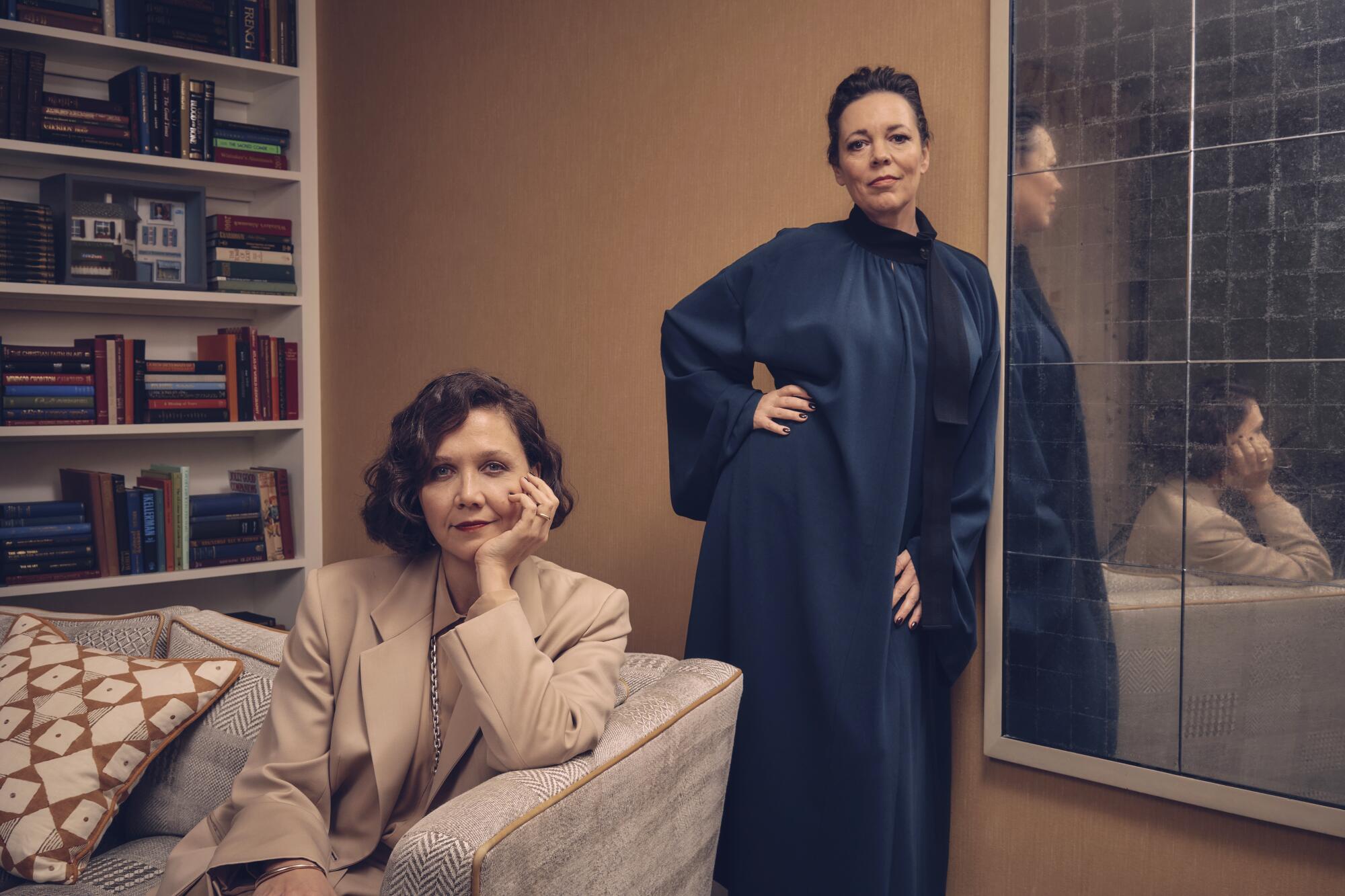
- Share via
Olivia Colman and Maggie Gyllenhaal are hanging at the posh Ham Yard Hotel in London’s Soho district, and there’s a low-key freak-out happening because Phoebe Waller-Bridge is in the venue’s theater to see “The Lost Daughter,” Gyllenhaal’s keenly observed filmmaking debut, and Gyllenhaal is wildly excited and mildly nervous about how she’s going to react to the movie.
“She’s going to love it,” Colman assures Gyllenhaal, and as Colman worked with Waller-Bridge, playing her godmother on “Fleabag,” her comfort carries some weight. But after a pause, Colman, a woman given to playful silliness, can’t help herself. “What if she isn’t in the theater? What if she made a big scene and walked out?” Gyllenhaal laughs and jumps right on board. “Phoebe Waller-Bridge has left the building!” (Judging from a post-screening embrace between Gyllenhaal and Waller-Bridge, posted on social media, everything turned out OK.)
This easy camaraderie between Colman and Gyllenhaal began from the moment they met on the Fourth of July in 2019. Gyllenhaal was several months into adapting “The Lost Daughter,” Elena Ferrante’s novel about Leda, a middle-aged professor taking a working vacation on a Greek island. A chance meeting with a young mother, Nina (played by Dakota Johnson), prompts Leda to make some curious choices as she sifts through her own conflicted feelings about being a parent.
Gyllenhaal sent Colman the script, thinking, “Why not? I have nothing to lose.” And she had always seen something in Colman’s work that felt like Colman knew her, understood her and could teach her something. Then they met in New York on the Fourth, ordered a bunch of food, didn’t touch a bite of it and got drunk on Champagne.
“It’s an old-school approach, but it works,” Colman says, laughing. “Really, we just couldn’t bear saying goodbye to each other. So we kept chatting and chatting and drinking and drinking and here we are.”
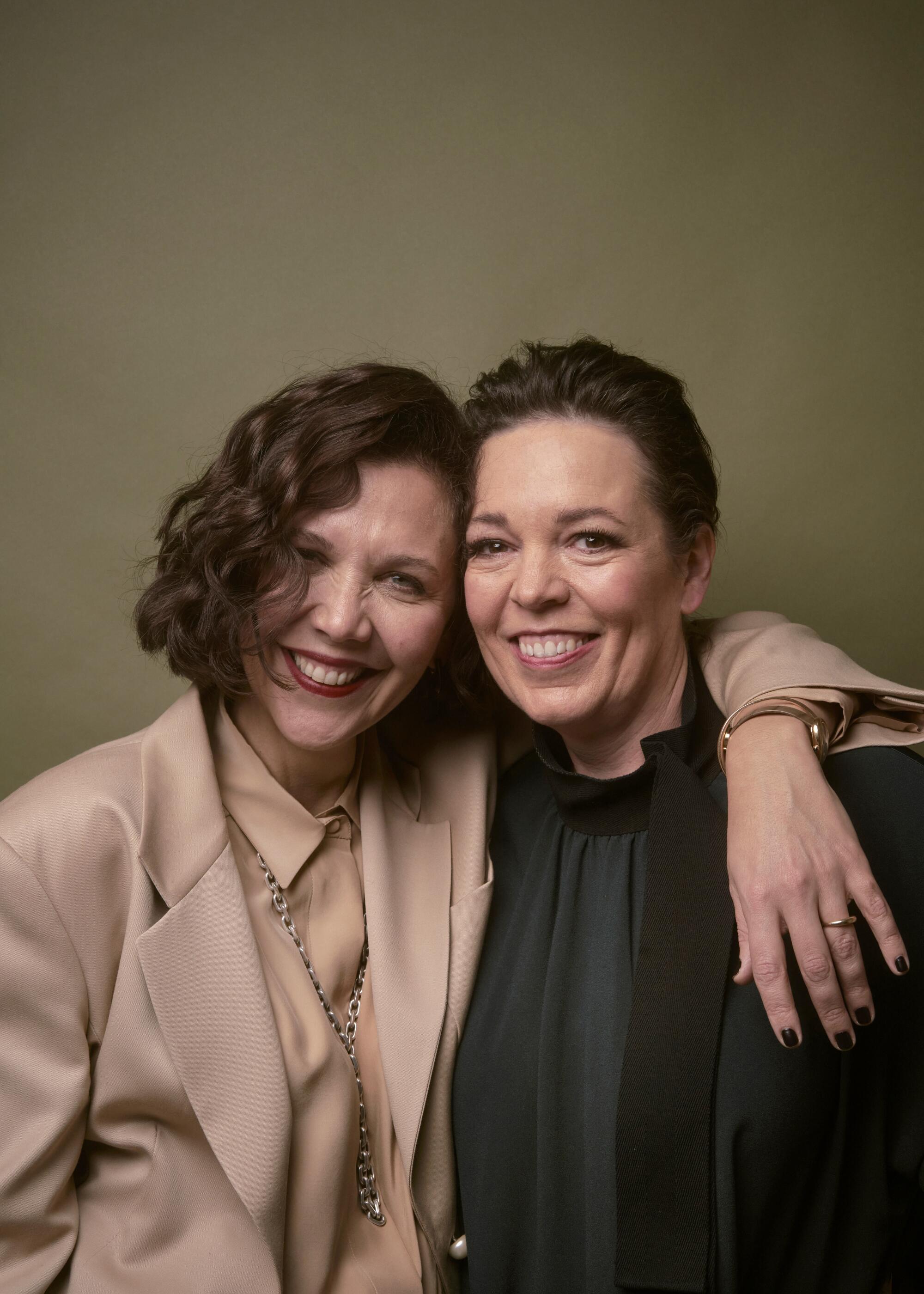
Watching “The Lost Daughter,” it’s easy to see why Gyllenhaal cast Colman, an actor capable of finding the heartbreak and humor within the thorny Leda and navigate the film’s uncompromising, empathetic look at motherhood. Not long after Leda lands at the island, her respite is interrupted by the arrival of a family of noisy Americans. The invaders’ pregnant matriarch (Dagmara Dominczyk) asks Leda to move her chair at the beach, prompting a tense standoff that’s eventually defused. Birthday cake is proffered. Leda reluctantly accepts. “Children are a crushing responsibility,” Leda tells the woman. “Happy birthday.”
“It’s the first time people really talk in the film, and the dialogue is sparse and succinct,” Colman says. “It’s basically, ‘You don’t know me. You don’t know what the f— you’re talking about.’”
Through flashbacks, we see the young Leda (played by Jessie Buckley) struggle with balancing the demands of mothering young children and her burgeoning academic career. The scenes are sometimes painful to watch. When Colman first saw “The Lost Daughter” at its Venice Film Festival world premiere, she says she had to look at the ceiling and count to 10 during the moment when Buckley’s Leda refuses to kiss her daughter’s hurt finger.
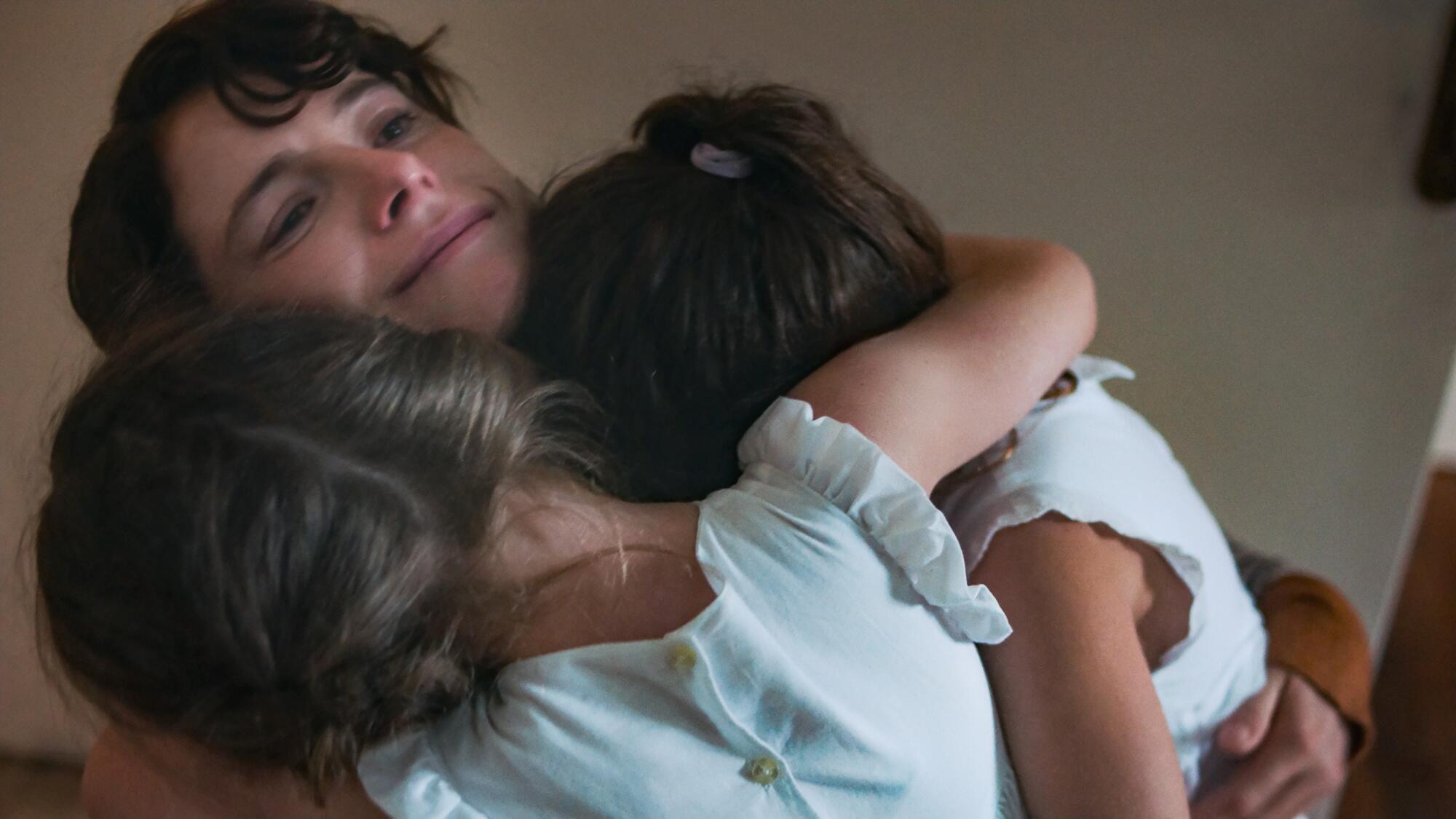
“It broke my heart,” Colman says. Gyllenhaal nods in agreement. “This isn’t about how difficult it is to raise a child. We’re talking about the moments of terror and absolute desperation along with moments of true, heart-wrenching ecstasy. We’re talking about both sides of the experience, not just that it’s f—hard. We all know it’s f— hard. There are sitcoms about that. But what about the times as a parent when you’re not really sure you can manage? How could it be that that’s not part of every parent’s experience?”
When Colman, 47, saw the movie a second time at the London premiere in October, she invited lots of her “girl mates” to join her, the idea being that it’d be fun to dress up, get together and have a drink afterward. But when the movie ended, Colman’s friends confronted her, chiding her for not preparing them for the scenes in which young Leda loses it.
“For days afterward, I’d hear from them … ‘That was me on screen,’” Colman, who has three children with husband Ed Sinclair, says. “The sweetest, gentlest, quite possibly the nicest mom in the world told me, ‘I definitely slammed the door too hard.’ All these moments we’re not proud of, and you see them in the movie and think, ‘I’m not proud of that, but at least someone else knows what they feel like.”
Adds Gyllenhaal, 44, a mother of two daughters with actor Peter Sarsgaard: “Leda threw a doll out the window. That’s f—up, right? But she’s not going to jail. It’s not abuse. But those are the things that come back to you, when you’re overwhelmed and every once in a while, you get a little hot in your heart and later think, ‘Oh, God, I shouldn’t have done that.’”
Colman had to leave the premiere’s after-party early as she had to work the next day on the Marvel limited series “Secret Invasion.” (“That would be quite a big deal to turn up smelling of booze on the first day of shooting,” she says, laughing.) Sadly, that meant there could be no reprise of “The Lost Daughter” scene in which Colman sings Bon Jovi’s “Livin’ on a Prayer” at the top of her lungs while dancing wildly.
“I had ‘Slippery When Wet’ on cassette,” Colman says of the hit-laden 1986 Bon Jovi album. “It was one of the first albums I ever bought. I knew that song well.” She laughs. “Very little acting needed on my part.”
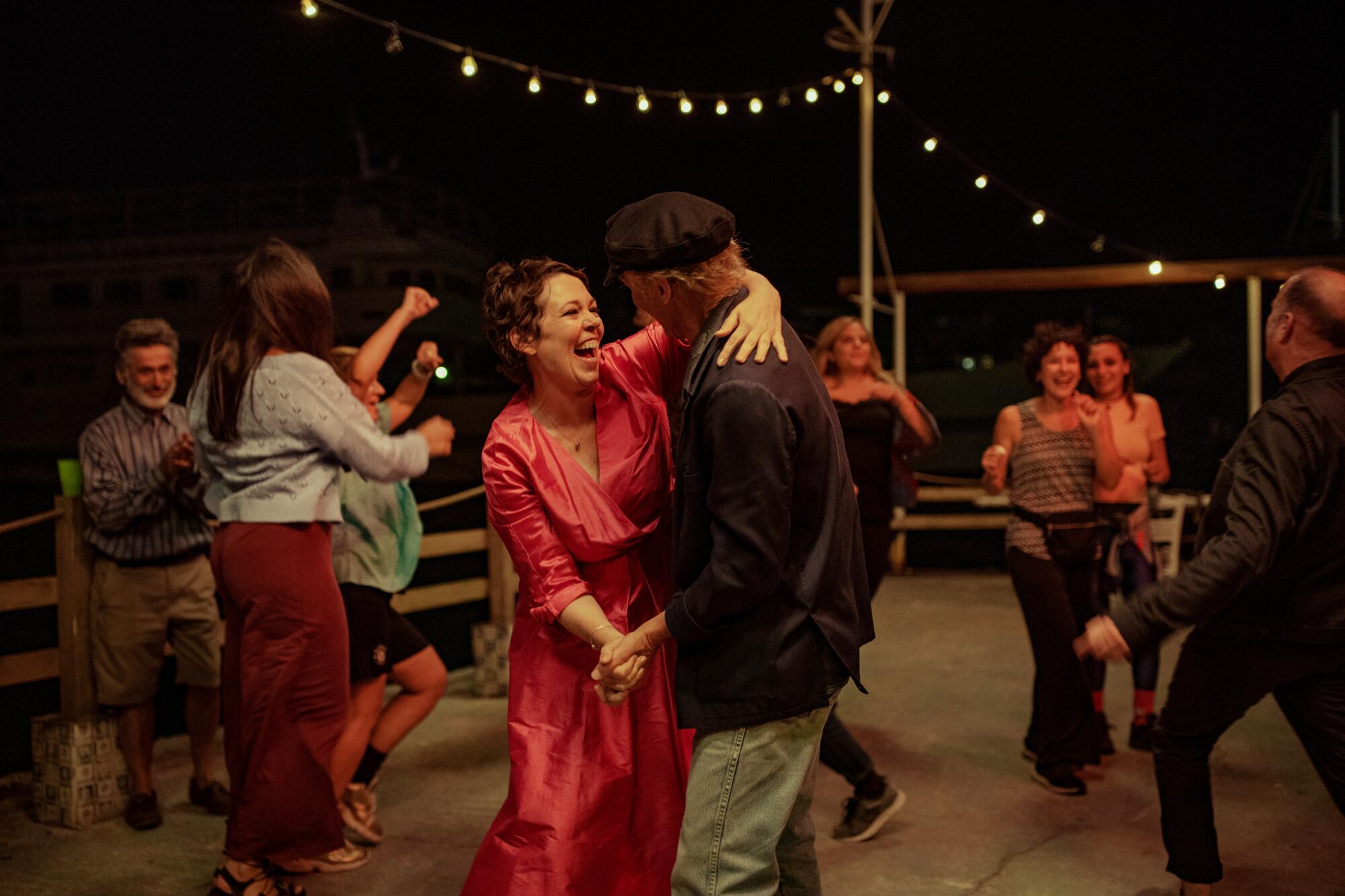
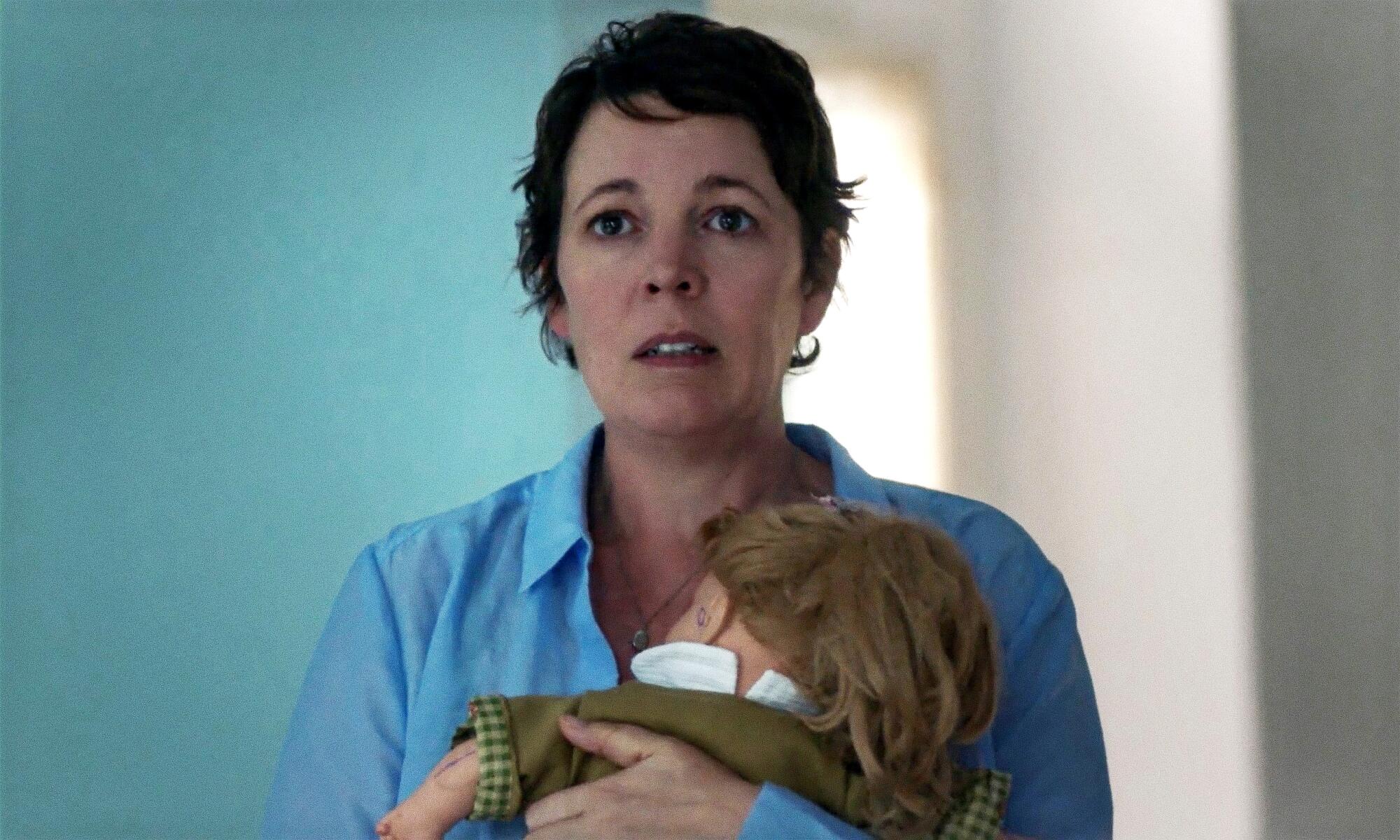
That dance scene marks the moment in the movie when Leda begins to spring to life … which brings us to the film’s ending. [If you haven’t watched this Netflix drama, you might want to stop reading now.] In the novel, Nina stabs Leda with a hat pin. Her cellphone rings; her daughters are calling.
“Mama, what are you doing, why haven’t you called? Won’t you at least let us know if you’re alive or dead?” Leda’s answer. “I’m dead, but I’m fine.”
From the moment she began writing the adaptation, Gyllenhaal was thinking about the book’s last page. How could that be the ending? Though Gyllenhaal doesn’t know this for sure, she believes Ferrante (a pen name, the novelist has kept her identity hidden — even from Gyllenhaal) intended the ending to signify that Leda had left behind her shame and anxiety and been reborn.
“It’s a life or death situation inside her mind,” Gyllenhaal says. “Either she’s going to slowly die cosmically in her heart or she’s going to be the hero that I think she is and be brave enough to look at the most painful parts of her life and the consequences of them. I think putting a light on the darkest, most painful places enables a little sprout of life to come.”
Or, to put it another way: “There’s no part of me that thinks she’s physically dead … though I love that people ask the question!”
In the movie, after Nina stabs her, Leda drives away and crashes her car. She stumbles to the beach, where she wakes up the next morning and talks to her daughters on the phone. “Dead? No, I’m alive, actually.” She also peels an orange … an orange that seems to magically appear out of nowhere.
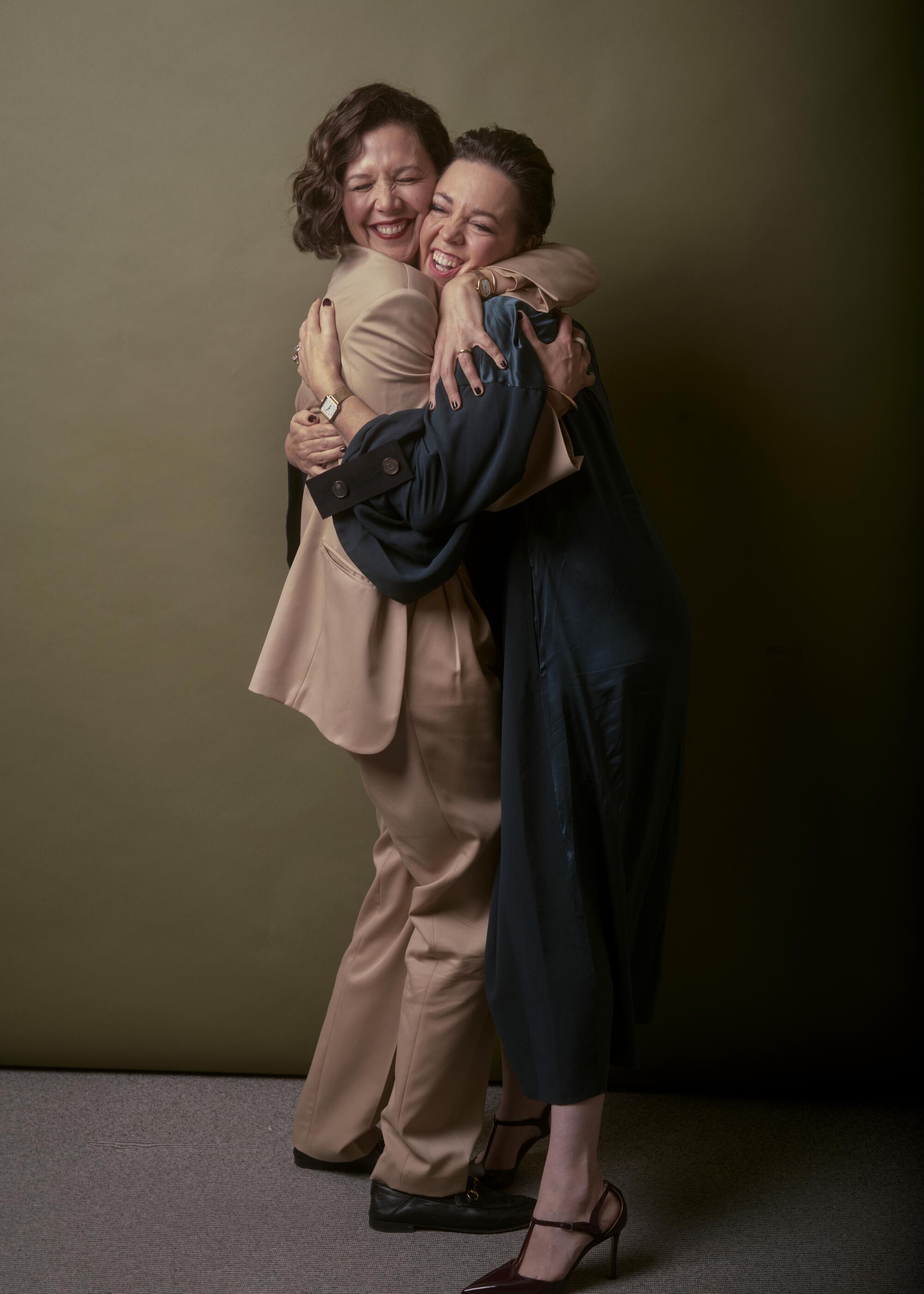
“OK, you want to know how that orange came about?” Gyllenhaal asks, smiling. Colman can’t resist. “I was really hungry on set that day.” Gyllenhaal laughs. “Do you know how hard it is to find oranges in Greece?”
Actually, the orange is a callback to the times when Leda as a young mother would single-peel the fruit for her daughters. Gyllenhaal says she wanted to add a simple bit of movie magic to the scene, like the moment at the end of “Being There” when Peter Sellers’ Chance appears to walk on water.
“Our unconscious mind is magical,” Gyllenhaal says. “That’s the orange. And then Olivia improvised something on the day when she was on the phone to the daughters. She said, ‘Tell me all about it.’ And that is what makes her a mother, right? ‘Oh, you guys don’t actually care that I’ve just been stabbed in the belly’ … or they care, but like all children, they need their mom. They’re calling to tell her something, and she’s just got to be there and just listen.”
“Ooooh, that’s nice,” Colman says. “And so true.”
More to Read
From the Oscars to the Emmys.
Get the Envelope newsletter for exclusive awards season coverage, behind-the-scenes stories from the Envelope podcast and columnist Glenn Whipp’s must-read analysis.
You may occasionally receive promotional content from the Los Angeles Times.









